(Photo: Melting gondola at Aspen Snowmass’ Ajax Mountain, by Carbondale-based artist Chris Erickson.)
If you love skiing — heck, if you love the planet — here are two words sure to send a chill down your spine:
Global warming.
Which is why I’m writing this today. Earth Day is April 22, the time of year when we try to raise awareness about protecting the environment. And yes, there’s no doubt it needs protecting. Believe it or not, there are still some lunkheads who don’t take global warming seriously. Sure, we’ve had some below-zero days this winter. But for some, that’s enough to prove that global warming is a myth. Like just because it’s cold today means our climate isn’t getting warmer. Consider this: At Aspen Snowmass, the average temperature has increased three degrees Fahrenheit since it opened in 1946, causing the resort to lose nearly 30 days of winter season over that same period. And as someone who lives in Vermont, this is pretty scary: If global warming remains unchecked, by mid-century Northeast ski resorts will face about a 50% decline in the days when conditions are favorable enough for making snow. If we limit emissions of greenhouse gases that trap heat, we could reduce that to a 10-30% decline.
As skiers, we have a special interest in keeping our planet cooler. Without cold winters — without snow — we won’t be able to ski. But it’s not just about us. Global warming has also been linked to longer, more frequent droughts, declining water supplies, more forest fires, reduced agricultural yields, and flooding and erosion in coastal areas.
So it’s encouraging to learn that some gear companies are working to reduce their carbon footprint. It’s not only responsible, but it makes good business sense. Without snow, there’s no skiing. And without skiing, they’re out of business.
Here are a few you might want to support:
Patagonia
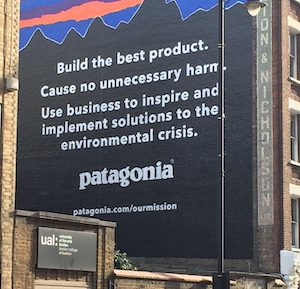 Few clothing companies have as big a commitment to the environment as Patagonia. They’ve actually made it part of their corporate culture. For example, the company has a program that allows employees to leave their jobs to work for the environmental group of their choice for up to one month, during which Patagonia pays their salaries and benefits, and environmental groups get them for free.
Few clothing companies have as big a commitment to the environment as Patagonia. They’ve actually made it part of their corporate culture. For example, the company has a program that allows employees to leave their jobs to work for the environmental group of their choice for up to one month, during which Patagonia pays their salaries and benefits, and environmental groups get them for free.
But wait, there’s more: Since 1985, they’ve given more than $100 million to environmental causes. They also plan to make the entire company and its supply chain carbon neutral — possibly even carbon positive, removing more carbon from the atmosphere than they emit —by 2025. To minimize the adverse impacts of its products, Patagonia uses 87% recycled materials. All the polyester, nylon, and wool materials it uses are made from recycled fabrics. The company also uses cotton that’s certified organic by the Global Organic Textile Standard (GOTS) as well as traceable goose feathers. What’s particularly encouraging is that even though the company wants to sell you its products, they also want to make sure these items don’t end up in a landfill. So besides accepting them for recycling, Patagonia has launched a page on which customers can sell gently used Patagonia garments. You can find out more about their environmental activism here.
Picture Organic
Picture Organic makes it their mission to fight climate change. The company has always relied on organic, recycled, or responsibly-sourced materials. All their products are made in factories that are run on renewable energy. Even their packaging is eco-friendly. Picture Organic uses bio-sourced and compostable polybags, and they ship products via the least impactful modes of transportation possible. In 2019 they earned B Corp certification, the highest distinction for companies committed to making environmental and social responsibility a core part of their business.
Cortazu

Cortazu
Cortazu is a Netherlands-based company committed to ethical manufacturing, re-greening the planet, and delivering high quality outerwear products. The company has a three-fold mission: minimize impact through technical innovation, ethical production, and restoring nature by regreening land. They’re the first Dutch outdoor brand to achieve a B Corp certification. For every product sold, Cortazu regreens land at the foot of Mount Kilimanjaro, Kenya. To do so, Cortazu has partnered with Justdiggit, a non-profit organization that fights global warming by building ‘water bunds’ in Africa. Water bunds capture rainwater and make large areas of dry land green, which benefits nature, people, and the climate. The company is currently launching a new collection of ethically made, sustainable jackets. Recycled components are used in every product of the new collection. The insulation for the new mid-layer jackets is made entirely from recycled water bottles.
Mons Royale

Mons Royale
Mons Royale creates high-performance merino wool apparel for biking, snowboarding, skiing and trail running. To do this, they source sustainable natural fibers from an ethical supply chain. The company has partnered with ZQ Merino to track the farm where all their wool comes from. All the sheep bred for their wool live free range and are never transported, crammed in a pen, put in a position to feel stressed, or exposed to GMOs or harmful chemicals. They’ve also partnered with Shanghai Challenge Textiles (SCT), an innovative world class manufacturer specialising in merino wool. SCT is the first manufacturer in Shanghai to be awarded the new Chinese Environmental Certification. Even Mon Royale’s packaging is eco-friendly. Mon Royale has phased out 90% of virgin plastic from their hang tags and accessories, replacing them with recycled and natural alternatives. Their products are packaged in plant based compostable bags and FSC certified paper and transported in container ships, which generate an average of 20 times less CO2 than air freight.
Grass Sticks
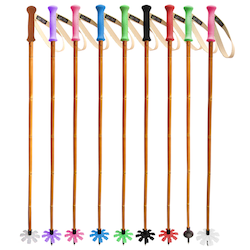
Grass Sticks
Long, long ago, before they were made of carbon or aluminum, ski poles were made of bamboo. (I actually have an ancient pair hanging on a wall in my house.) With Grass Sticks, it’s back to the future. Grass Sticks’ poles are made of sustainable bamboo. Per acre harvested, bamboo produces three times as much lumber as trees, absorbs more CO2, and produces more oxygen than any other plant. The poles are lightweight and strong, with a great combination of rigidity and flexibility.
Salomon
One of the big players in the ski industry. No matter. Salomon is a member of the the Sustainable Apparel Coalition (SAC) — the apparel, footwear, and home textile industry’s alliance for sustainable production — and is also a founding member of the Outdoor Sports Valley (OSV), the French Outdoor Industry’s organization established in 2009 to engage in environmental initiatives such as a common repair center for apparel and seeking alternatives to PFC for DWR treatments. With other outdoor brands, Salomon helped bring about the 2016 opening of the Mont Blanc Outdoor Repair Center, where brands can get gear repaired, extending its life, and workers can get training opportunities and secure employment. The company’s headquarters at the Annecy Design Center has been ISO14001 and ISO50001 certified since 2017 (energy, water, and risk management). Salomon also signed the United Nations Fashion Industry Charter for Climate Action in December 2018, and has committed to reduce its carbon emissions by 30% by the year 2030. Its commitments include that 100 percent of its suppliers meet or exceed its social compliance standards, and all material suppliers must adhere to the Materials Compliance Programs and Restricted Substances Lists.
Zeal Optics

Zeal Optics
Using less and giving back are two of Zeal Optics’ major initiatives. The brand’s 100% plant-based sunglass frames and lenses break down quicker than traditional petroleum-based ones, and goggles (produced at a solar-powered factory) are shipped with recyclable material in place of foam inserts. The brand also removes plastic from the oceans and plants trees for products sold, and partners with organizations that support the environment and protect public lands.
Phunkson Wear
Phunkshun Wear is made using recycled plastic bottles, which are collected domestically to ensure a smaller transit carbon footprint, before being turned into stylish and functional gear. The company gives its employees financial incentives to utilize ride-share, bike, or take public transit. It also provides train and bus passes to its employees at no cost.The company has been recognized for its sustainable efforts by the State of Colorado, which has given it its highest level of certification.
Grown Skis
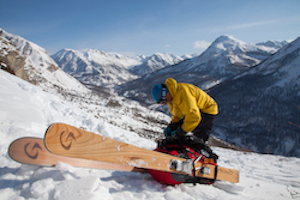
Grown Skis
Grown sells the first ski with an individual ecological footprint calculation expressed in grams per cubic centimeter volume of ski, allowing customers to compare products by their ecological performance. The company uses a 100% industrial hemp fiber and Paulownia wood composite as well as a sandwich core construction. Why? As it grows, hemp captures carbon dioxide, a contributor to the greenhouse effect causing climate change.They’ve also eliminated most non-natural materials in the top sheet, side walls, and reinforcements. Instead, they use volcanic basalt and recycled material. Grown skis claims to have the first climate neutral skis on the market, where the remainder of the carbon footprint has been offset with climate protection projects in Europe.
WNDR Alpine
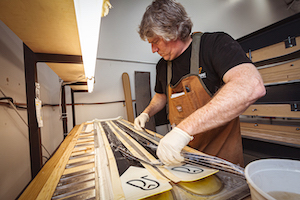
WNDR Alpine
If you’ve always thought of algae as pond scum, this is going to blow your mind. Because WNDR Alpine uses polyurethanes made from plant-based algae. The company uses technology developed by Checkerspot to produce skis using biotechnology. The algae-derived oils take the place of petroleum-derived ABS plastic that makes up the sidewalls of traditionally manufactured skis. Laminated algal cores, layered with strips of domestically grown aspen, are also used to make up the heart of the ski. The result is an environmentally friendly, sustainable ski made with minimal waste.
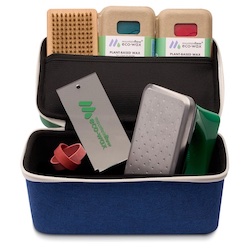
MountainFlow wax
Eco-Friendly Ski Wax
More and more wax manufacturers are moving away from petroleum-based products to waxes that use environmentally-friendly materials. NZero and MountainFlow Eco-Wax, for example, make sustainable waxes and lubricants using only natural vegetable ingredients — never ingredients from petroleum (crude oil) or fossil fuel resources.
Kudos to all these companies for their efforts. But much more needs to be done. So while it’s important for more gear companies — heck, more companies of any sort — to commit to reducing their carbon footprint, it’s something all of us should get behind, too. What can you do? Buy green products (nothing speaks greener than green cash). Recycle. Reuse. Carpool when you go skiing. Better yet, take public transit, if at all possible. Every little thing we can do helps. And maybe all together, we can make a difference.





